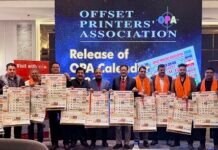At CorrExpo India 2025, MLM India, a leading importer and supplier of quality paper, paperboard, pulp, and newsprint, showcased its extensive portfolio and highlighted its role as a key link between global producers and Indian converters and corrugators.
Chirag Jain from MLM India stated that the company imports a wide range of forest products and pulp from diverse regions, including North America, Europe, Russia, Japan, Australia, and South America. These imports are supplied to Indian converters and corrugators, who, in turn, manufacture packaging products for a range of industries—from solar panels and electronic goods to automobile boxes and agricultural produce.
“Predominantly, we are more toward virgin imported paper. We also supply pulp to many mills in India for a variety of applications,” Jain explained.
Jain welcomed the government’s recent move to impose a minimum import price (MIP) on virgin multi-layer paper board. “It’s good for the industry because there should be clear benchmarking,” he said. However, he acknowledged the challenge of inflation and the eventual passing-through of higher costs to converters and end customers. “It will take a few months to get it absorbed in the supply chain,” he added.
At the exhibition, MLM India focused on highlighting raw materials sourced globally, such as craft liners, semi-chemical fluting, and white top craft liners. These products, primarily made of long fiber and pure pulp, are critical for India’s growing agricultural and industrial packaging needs.
“For example, semi-chemical fluting is 100% virgin pulp used in banana and grape boxes. With India’s agro production increasing, demand for such high-strength packaging will rise,” Jain noted. However, he emphasized that domestic mills face challenges in producing such products competitively due to economies of scale. International mills, equipped with high-end machines and massive capacities running into millions of tons, have mastered the production quality.
Growth for Indian paper mills
Asked about the future of Indian mills, Jain acknowledged the strong growth potential but stressed that consolidation would be key. “The business will become more regional, but corporates acquiring paper mills or corrugators will operate pan-India, offering one-stop solutions to corporates across regions,” he said.
According to him, the path forward for Indian mills lies in identifying their regional or product niche, which will help them withstand competition from imports while catering to local demand efficiently.
The key highlight of MLM India’s future strategy is its aggressive warehousing expansion. Currently, the company operates warehouses in western and northern India. In the west, it has two warehouses near Kandla in Gujarat and the Nhava Sheva port near Mumbai in Maharashtra with storage capacities of 5,000 tons and 10,000 tons, respectively. In the north, a facility at Mandoli, near Delhi, offers 3,000 tons of capacity. The company plans to extend its footprint further south.
For MLM India, CorrExpo was more than just a platform to display products. Jain emphasized the value of networking with industry leaders and peers. “They know we are here for the marketing phase. Also, it helps maintain relationships,” he said.

















